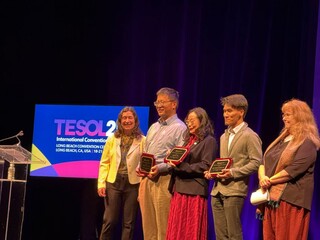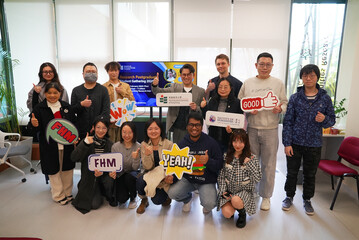EdUHK Digital Communication Programme for a Diversified Workforce Transformation and Expanded Career Prospect
- 02 May, 2024
- Feature Stories
- Faculty of Humanities
Language is the primary tool for information exchange in the digital world. Arts students of the new age should not only be biliterate and trilingual but should also be equipped with knowledge in digital literacy and application skills. As industries accelerate digital transformation, the Faculty of Humanities, EdUHK, is offering the Bachelor of Arts (Honours) in English Studies and Digital Communication” programme to improve students’ competitiveness. The programme provides a wide range of courses in English language, linguistics and digital literacy, such as English subject knowledge, information management, computer-assisted translation, and speech technology. Students will master knowledge in both the humanities and digital technology and understand the industry trends and needs. The programme provides an excellent background for job opportunities in education, media, journalism, publishing, and communication. Graduates are also well-equipped to work for international technological enterprises or other businesses with technology-driven innovation.
Biliterate and Trilingual Talents, Competitive with Digital Literacy
“It’s not enough just being proficient in English,” said Dr Albert Lee, Assistant Professor of the Department of Linguistics and Modern Language Studies. Being a salesman in a Japanese-owned company when he first started working, he recalled what his supervisor said. The supervisor’s advice was a slap on the face: “He reminded me to learn more about information technology and data processing for self-improvement. Otherwise, I would be nothing more than the company’s mouthpiece.” With this in mind, Dr Lee would like to share his experiences to help students avoid detours. As the Faculty of Humanities, EdUHK now offers the Bachelor of Arts (Honours) in English Studies and Digital Communication programme to both first-year-first-degree students and senior-year entry students, Dr Lee encouraged students to equip themselves for challenges ahead.
“As a young and vibrant university, we strive to offer innovative and practical courses with an innovative mind to respond to the society’s needs,” stated Dr Lee, the Programme Leader. The core part of the programme includes both English studies and programming knowledge, building a solid foundation in English language, linguistics, and digital literacy. The knowledge is consolidated by hands-on experience in using digital tools for language applications in areas like speech technology, integrating theory with practice.
A Bridge for IT Professionals for Digital Transformation
Nowadays, IT talent is in hot demand as industries embrace new technology in the new digital age. From developing language learning applications to designing financial technology systems, communication between software engineers and clients is difficult if the former does not have relevant training or if the latter lacks the foundations in IT. Dr Lee hopes that the programme “can nurture talents in digital communication, becoming the bridge between IT professionals and their clients by relaying information in the development process in language that the client would understand.”
Hands-on experience is a vital part of applying one’s knowledge. In the final year project, students are required to develop a chatbot or attempt speech synthesis. “For the product, you can ask it to tell a story or even sing!” Dr Lee quipped. The internship is another graduation requirement that aims to engage students in applying digital literacy in real life, preparing them for their careers.
Self-Improvement Brings about Diverse Career Choices
Looking back, Dr Lee lamented, “If I had these IT skills, my work would have been much more efficient.” The experience prompted him to study for a master’s degree related to information systems, blazing new trails in his career development. Similarly, the new programme hopes to provide more opportunities to expand students’ career pathways. In addition to the existing senior-year intake, The “Bachelor of Arts (Honours) in English Studies and Digital Communication” programme will be also available for first-year-first-degree admissions, and welcomes applications from students interested in English, linguistics, and IT. The programme is also suitable for non-Chinese speaking students as its medium of instruction is English.
The full-time programme leads to diverse career possibilities. Graduates can work in international technology companies or enterprises seeking out and applying technological innovations. Traditional industries such as education, media, journalism, publishing, and communication are also digitizing; talent with high English proficiency and digital literacy is desired to stay in touch in this globalised English-speaking world. “Ultimately, we need to be flexible and adaptive,” said Dr Lee.
Nurturing Lifelong Learners, Keeping up with the Pace of Technological Change
Technology has transformed all aspects of life, including humanities research. Dr Lee was ecstatic when he spoke of his colleague’s innovations. “No one is carrying tomes around anymore. One of my colleagues used big data and text mining to analyze Shakespeare!”
The COVID-19 pandemic has digitised education. The new normal of online learning has posed challenges for many seasoned teachers. “As education moves beyond the classroom, the need for flexibility and resilience in pedagogical settings would only be greater and greater,” concluded Dr Lee. The world and its technology are ever-changing; Dr Lee hopes students can “become lifelong learners, not holding back themselves when faced with challenges because of the need to develop new skills.”
On a macro level, digital communication plays a vital role in the global economy in the wave of globalisation and digitisation. Dr Lee pointed out that excellent cross-cultural communication skills aid students in the fast-paced and cross-boundary career landscape. “Day-to-day communication relies not only on linguistic knowledge but also an understanding of cultural differences. By adjusting their tone and communication strategies, students will find themselves yielding twice the result with half the effort.”
Greater Bay Area as International Innovation and Technology Hub, Requiring Cross-Cultural Talent
Hong Kong and the Greater Bay Area will become the international innovation and technology hub under the National 14th Five-Year Plan. International technological companies and startups are encouraged to set up business here. Dr Lee expected graduates of the programme to be highly sought after with their solid foundation in the English language and proficiency in digital communication. The programme offers the elective “English for Cross-Cultural Communication in the Greater Bay Area and Beyond” to cater to the need of working in cross-cultural settings. He added that students can choose to undertake their internship in the Greater Bay Area to familiarise themselves more with the environment.
Times have changed, and data analysis skills have become essential for everyone. Dr Lee reminded students: “If you are an English major student, and Excel means nothing more than a blank table, you might want to rethink if you are catching up with the times.”






